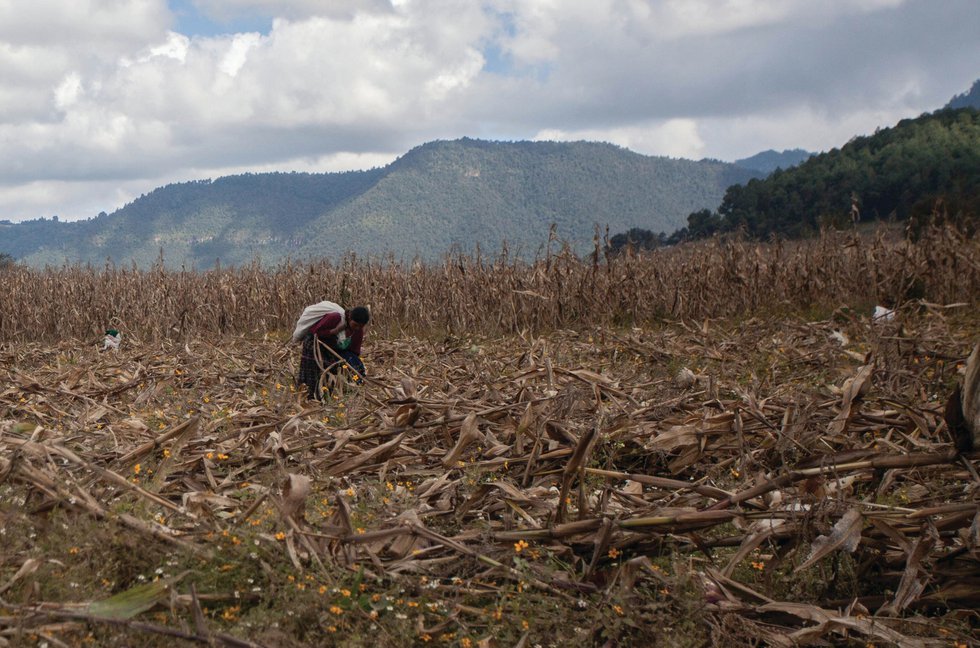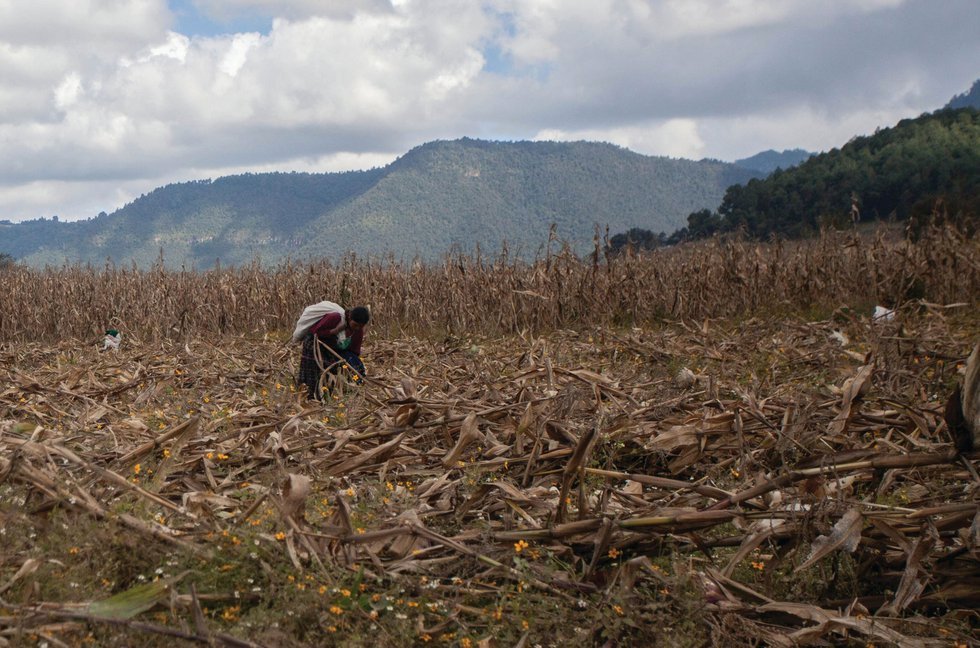
There is growing desperation across communities in Guatemala. Twenty-five years after the end of the country’s thirty-six-year-long civil war, the lack of hope—resulting from an economic crisis and government inaction—is driving tens of thousands of people to migrate in search of opportunity.
On December 29, 1996, the signing of the peace accords between the Guatemalan government and the guerrilla leaders of the Guatemalan National Revolutionary Unity, or Unidad Revolucionaria Nacional Guatemalteca, opened the door to resolving what caused the war. These problems included social inequalities, racism, and poverty, all of which have plagued Guatemala since the Spanish invasion in 1524, and worsened following the 1954 U.S.-backed coup d’état against democratically elected President Jacobo Árbenz.
For a brief moment, it seemed, “there was great hope in the signing of that peace agreement,” says Ana López, the former director of the Guatemalan National Council for the Compliance with the Peace Accords. “It opened paths for us. This was very fertile ground.”
New institutions were formed to address systemic issues. Programs for rural development to address land disparities emerged, and a secretariat of land, women, and Indigenous peoples was established to reduce discrimination.
But in the past twenty-five years, many of these institutions have come under attack. Political will in adhering to the agreements has eroded, especially as administrations with connections to the military have become more common.
Since 1996, Guatemalan governments have consolidated and limited the state institutions; far-right politicians have proposed amnesty for soldiers accused of war crimes. What’s more, fraud and corruption have emerged, and the inequalities that caused many to take up arms in the 1960s and 1970s have remained.
The administration of Alfonso Portillo (2000–2004) was among the first to depart from the spirit of the accords, allowing the Guatemalan military to work in collaboration with the newly formed Guatemalan National Civilian Police. According to López, the accords were only implemented between 1997 and 2005. But the largest blow came with the presidential election of former general Otto Pérez Molina in 2011.
The Pérez Molina Administration (2012–2015) showed a lack of interest in maintaining the advancements created by the accords. Programs such as the National Reparations Program for victims of the conflict were underfunded and under-executed, with 2014 being the lowest funded year for the program, according to Impunity Watch.
The administration of Jimmy Morales (2016–2020) and the current administration of Alejandro Giammattei took further actions to limit the implementation of the accords. López was arbitrarily removed from her position at the end of 2019.
Just months later, President Giammattei closed the secretariat of peace and the secretariat of agrarian affairs, both of which were created through the accords with the intent of guaranteeing compliance with their goals.
The refusal of Guatemala’s political elites to comply with the accords has meant that Indigenous communities are among the hardest hit.
Guatemala’s civil war left more than 200,000 people dead, 45,000 disappeared, and one million displaced, the vast majority of Indigenous descent. Guatemala’s Indigenous Maya communities faced the brunt of the government’s brutal counter-insurgency, representing 83 percent of its victims. As a result, the Catholic Church–backed truth commissions determined that “acts of genocide” occurred. But then, in 1999, President Álvaro Arzú, who had been a signer of the peace accords, refused to accept the report’s findings.
Indigenous rural communities are now being abandoned even more frequently than anytime since the war ended. Today, poverty in rural Indigenous communities is as high as 83 percent in some areas. Opportunities—for job seekers at any education level—remain few and far between. For many, migration has become the only means of survival.
The increase in Guatemalan emigration in the last few decades is apparent in data from the U.S. Customs and Border Protection agency and from the Mexican National Institute of Migration. The number of Guatemalans detained entering the United States has steadily increased since 2007, with more than 265,000 apprehended in 2019 (in comparison, in 2012, U.S. Border Patrol apprehended 35,000 Guatemalans). There is, according to López, a direct tie between Guatemalan immigration to the United States and noncompliance with the peace accords by the Guatemalan government.
“The implementation of some of the measures of the peace accords would have provided more economic security.” says Nestór Rodríguez, a sociologist at the University of Texas at Austin. “But that didn’t happen the way it should [have]. And so there was nothing there to alleviate the pressure to migrate.”
The failure of the implementation of the peace accords is especially felt in rural communities, such as the remote village of La Bendición in the department of Escuintla on Guatemala’s southern coast. This community of more than 100 families, about forty minutes from the nearest highway and reachable only by a dirt road, sits in lush hills that are home to many bird species.
Twenty years ago, internally displaced families, primarily from the western highland departments of San Marcos and Huehuetenango, purchased the land—which was an old coffee plantation—through the Guatemalan Land Fund. They were promised that the plantation included abundant water sources, houses, and quality land for planting. But when they arrived, they found that none of these amenities were there. “It was fraud,” María Gabriela Fuentes, a thirty-eight-year-old resident of La Bendición, tells me.
The families struggled to renegotiate the debt for the land. Eventually, in 2015, with the assistance of a nongovernmental organization called Utz Che’, they successfully reduced the amount owed for the land. But this wasn’t enough to ease the pressures on the community.
The residents of La Bendición are now confronting economic emergencies that put pressure on young people—and even whole families—to flee to the United States.
Most of La Bendición’s families were displaced during the war or shortly after the signing of the peace accords. Among them is Verónica Hernández, a fifty-two-year-old from the department of San Marcos. She was born on a farm in the municipality of Nuevo Progreso, where her parents had worked. When the Land Fund sold the farm to families returning from Mexico, she joined the community in La Bendición to struggle for a piece of land.
“A group purchased the farm where we worked, but they only bought the land, not the people,” Hernández said.
It is estimated that, during the war, more than one million people were internally displaced, many refugees fled to Mexico, with a smaller portion of the displaced migrating to the United States. After the war’s end, many refugees returned to find that their lands had been taken by other farmers.
La Bendición has relied on agriculture to survive. They produce staple crops, such as beans and maize as well as tropical fruits and honey. But as the community has grown, so has the need for income and economic advancement. Hernández notes that many households in the village survive on ten quetzales ($1.30) per day.
“There is a lack of opportunity and a lack of employment,” Hernández explains. “If one of our children wants to work on a sugar cane plantation, [the employers] request that they show they’ve received education. They are asking for a lot of papers for employment.”
Fuentes echoes this, adding that her seventeen-year-old son left for the United States in August 2021. Hernández’s daughter also left for the United States. Overall, around eleven people have migrated from the small community so far in 2021. “He worked hard for very little,” Fuentes explains. “Because of that, he migrated.”
Both Hernández and Fuentes highlight that the persistent poverty in La Bendición, and in Guatemala as a whole, reflects the government’s failure to address the needs of the people and, specifically, the failure of the state to implement the peace accords.
“If they had complied with the accords, our lives would be something different, it wouldn’t be this,” says Fuentes. “It isn’t important to them that the people of Guatemala live with dignity.”
Forty years ago, Ramón Chavez, known as Poncho during the war, was in northern Guatemala with a rifle in hand, fighting against the Guatemalan government and the country’s economic elite. Chavez entered the guerilla movement in the late 1970s. But like many former guerrillas, he migrated to the United States just before the end of the war.
He stayed for six years before returning home, where he found that conditions had not changed all that much. “The government has never been interested in developing rural communities,” Chavez says in an interview. “Because of that, everything has stayed the same.”
The inequalities in state investment are also apparent in the amount the state spends on Indigenous communities, as opposed to non-Indigenous towns and cities. For example, in 2015, a research paper from the Central American Institute of Fiscal Studies found that, for every quetzal the state invested in non-Indigenous communities, it invested only forty-five cents in Indigenous communities.
Three of Chavez’s children have migrated to the United States. The money they send back as remittances has supported their family, who live in a village in the department of Sololá.
Life in Guatemala has grown worse for the majority of the country’s population in the twenty-five years since the signing of the peace accords—in spite of overall economic growth. Guatemala continues to have the largest economy in Central America, according to data from the World Bank.
Chavez points out that the value of the U.S. dollar and the low wages in Guatemala contribute to the decision of many to migrate. “The people look to earn more,” he says. “If one earns $100 in the United States, it multiplies here. If one earns 100 quetzales (roughly $13) per day, it doesn’t cover the costs.”
There are an estimated 2.9 million Guatemalans residing in the United States, according to the Guatemalan Ministry of Foreign Affairs. As more Guatemalans migrate, remittances to Guatemala have continued to increase significantly in the past two decades. In 2021 alone, migrants abroad sent more than $11 billion to family members, a huge jump from the $1.5 billion that they sent in 2002.
The growth of migrants to the United States is reflective of Guatemala’s low salaries and relatively high cost of living. The cost of basic goods in Guatemala currently hovers around 3,300 quetzales ($425) per month. Yet the country’s minimum wage does not cover this cost, with nonagricultural labor starting at 2,825 quetzales ($365), agricultural work at 2,742 quetzales ($355), and factory labor starting at 2,581 quetzales ($334) per month. But all too often, companies fail to even pay this monthly minimum wage.
In addition, the privatization of key sectors of the economy, including energy distribution and telecommunications, has led to an increase in costs. The few public services that still exist, such as education and health care, have seen little state investment.
“Your economy cannot absorb you, one cannot find work to sustain your family. Migration becomes an option to survive,” says Rodríguez. But in turn, one act of migration can lead to many.
“Migration has created a momentum and an inertia that keeps going because people succeed and they go back and they show off their new pickup trucks,” Rodríguez adds. “Many, not all, want the same benefits. They want to be migrants.”

Felecia Phillips Ollie DD (h.c.) is the inspiring leader and founder of The Equality Network LLC (TEN). With a background in coaching, travel, and a career in news, Felecia brings a unique perspective to promoting diversity and inclusion. Holding a Bachelor’s Degree in English/Communications, she is passionate about creating a more inclusive future. From graduating from Mississippi Valley State University to leading initiatives like the Washington State Department of Ecology’s Equal Employment Opportunity Program, Felecia is dedicated to making a positive impact. Join her journey on our blog as she shares insights and leads the charge for equity through The Equality Network.




